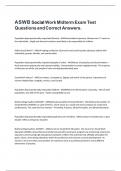ASWB Social Work Midterm Exam Test
Questions and Correct Answers.
Population disproportionality impacted (Women) - ANSFeminization of poverty -Women earn 77 cents on
the male dollar, -Single and divorced mothers more likely to be responsible for children
Define Social Work? - ANSoA helping profession oEconomic and social injustice advocacy oWork with
individuals, groups, families, and communities
Population disproportionality impacted (people of color) - ANSHistory of prejudice and discrimination—
limits economic opportunity and upward mobility, -Concentration in certain neighborhoods -The majority
of the poor are white, but people of color are disproportionately poor
Social Work Values? - ANSCore Values: Competence, Dignity and worth of the person, importance of
human relationships, Integrity, service, social Justice
Population disproportionality impacted (children) - ANSReflects the feminization of poverty -24% of total
population, but 36% of the poor -Varies substantially by race
National Organizations (NASW)? - ANSNational Association of Social Workers. The National Association of
Social Workers (NASW) is a Code of Ethics, which serves as a social and moral compass for social work
professionals. This code has four sections—Preamble, Purpose, Ethical Principles, and Ethical Standards.
Population disproportionality impacted (people who are homeless) - ANSIncrease in homelessness in past
decade -Often a temporary situation
National Organizations (CSWE)? - ANSCouncil on Social Work Education. The Council on Social Work
Education (CSWE) is the professional entity that accredits social work programs by monitoring social work
educators and ensuring high educational standards. CSWE is the authority that officially articulates the
goals, values, and training objectives within the profession and oversees curricula development. Its
mission is to ensure that social workers are trained to work at a professional level in many different
dimensions of practice.
, Temporary Assistance for Needy Families (TANF) - ANSReplaced Aid to Families with Dependent Children
•Provides states with block grants •Community service or vocational training
Difference between social work and other disciplines? - ANSThe general public often confuses social
workers with other human service providers, among them school counselors, mental health counselors,
psychiatrists, psychotherapists, public health workers and administrators, nurses, chaplains, and police or
others involved in criminal justice and corrections. While the roles and settings for some of these
occupations overlap, each has distinctive features, perspectives, methods, and areas of expertise. (See
Exhibit 1.2 for more detail on the similarities and differences between social work and some of these other
occupations.) But social workers incorporate the knowledge and skills of these other occupations as
needed to serve clients and communities.
Medicaid (1965) - ANSProvides federal matching funds to states to pay for medical care and services for
low income people
Scope of practice (BSW)? - ANSThe BSW, or BS in social work, is the entry level for the profession. The
academic credential is precisely defined: a bachelor's degree from a college or university social work
program or department that is accredited by the CSWE.Important goals of social work education are not
only to cover social welfare content and practice skills but also to provide a liberal arts education so
students can become good citizens. The liberal arts-oriented BSW curriculum introduces student learners
to social welfare history, communication skills, human behavior theories, and critical thinking about
diversity and the human condition.
Scope of practice (MSW)? - ANSA Master of Social Work (MSW) degree readies graduates for advanced,
specialized professional practice. It must be obtained from a program or department accredited by the
CSWE. The MSW degree is viewed as a terminal degree, meaning that select social work programs may
hire MSW social workers as faculty to teach clinical courses or as non-tenure-track faculty—especially in
fieldwork instructor roles.The curriculum of master's degree programs builds on generalist, BSW content.
MSW students develop a concentration in a practice method or social problem area; alternatively, some
master's degrees focus on advanced generalist practice. Thus, the MSW social worker should be able to
engage in generalist social work practice and also function as a specialist in more complex tasks.The basic
program for the MSW degree includes four core areas:Human behavior and the social environment, Social
work practice, Social policy, and Research methods. Some MSW degree holders who are satisfied with this
terminal degree or are working on their doctorates get jobs teaching at community colleges or in
universities as part-time instructors or sometimes in non-tenure- track "clinical faculty" positions. Other
doctorate-level social workers assume administrative positions at agencies or enter private practice as
psychotherapists.




